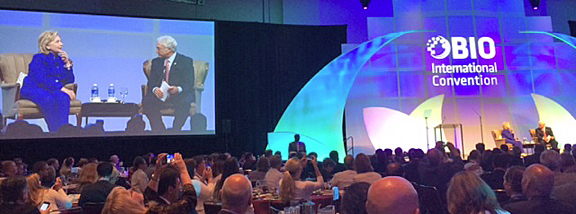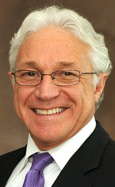Clinton sounds enthusiastic about biotech seeds, but has advice for industry at BIO convention
June 25, 2014 | 10:55 PM
 Biotechnology Industry Organization CEO Jim Greenwood interviews former Secretary of State Hillary Clinton at the BIO convention in San Diego today. (Jerry Hagstrom/The Hagstrom Report)
Biotechnology Industry Organization CEO Jim Greenwood interviews former Secretary of State Hillary Clinton at the BIO convention in San Diego today. (Jerry Hagstrom/The Hagstrom Report)SAN DIEGO — Hillary Rodham Clinton expressed enthusiasm for biotech seeds here today, but told members of the Biotechnology Industry Organization that they should promote the characteristics of genetically modified seeds rather than use the term “genetically modified” if they want the seeds accepted.
“‘Genetically modified’ sounds Frankensteinish — drought resistant sounds like something you’d want,” Clinton said.
The manufacturers of biotech seeds should “be more careful so you don’t raise that red flag immediately,” Clinton told BIO CEO Jim Greenwood on the stage of the annual BIO convention here. The occasion brought out more interesting statements from Clinton than during her speech to the joint Food Marketing Institute-United Fresh Produce meeting in Chicago earlier this month.
Clinton said she had promoted the drought-resistant seeds when she was secretary of State as part of her campaign to shift U.S. food aid programs from providing commodities to helping farmers in Africa and other food-scarce places grow more food themselves.
“A lot of people thought it wasn’t possible” to increase food production in developing countries because the soil was deficient and it was hard to convince smallholder farmers to work together and accept new technology, Clinton said. But she said she persevered, telling the farmers that drought-resistant seeds “won’t hurt them.”
But Clinton acknowledged that gaining acceptance for biotechnology “is painstaking” because proponents have to work both from the top down with presidents and prime ministers and from the bottom up with smallholder farmers.
There have been proposals to link foreign aid to those countries writing laws accepting biotechnology, but Clinton said she believed such efforts would backfire.

Greenwood did not ask Clinton, a likely Democratic presidential candidate in 2016, to take a stand on the labeling of foods with ingredients derived from biotech crops, and she did not.
He told Clinton that a label reading “genetically modified” doesn’t give the consumer “any useful information” and then added, “You don’t need to answer that.”
Greenwood also told Clinton that he believes organic farmers and food businesses are funding the efforts to require labeling because they want consumers to choose their products instead.
Clinton did not respond directly to that statement but said “the question of genetically modified food or hybrids has gone on for many, many years” and that there is a “big gap” between the facts and perceptions in that debate.
Greenwood also noted that BIO members produce biofuels, which they believe are a critical part of the answer to the greenhouse gas problem, but that some people oppose biofuels and think the concern about greenhouse gases is a hoax.
Climate change
Clinton took that statement as an opportunity to discuss climate change in general.
She said she believes it is necessary to separate those people who are “dug in ideologically” and those who are favoring or opposing certain policies because it is in their short-term commercial and economic interests.
Clinton endorsed President Barack Obama’s executive branch actions to address emissions from coal-fired power plants because the regulations will give the states that have more work to do more time to reach the goals.
At the same time, she said, there needs to be a fight against “the direct challenge from economic interests” that do not want states to continue their tax credits for renewables.
Clinton also criticized the press for giving climate change deniers a “false equivalency” with the overwhelming majority of scientists who have concluded that climate change is occurring.
“The debate is settled,” she said. “What is not settled is what we’re going to do about it.”
Clinton also endorsed the “Risky Business” report released this week by former Treasury Secretary Hank Paulson and other leaders that calls on business and civic leaders to build expectations about climate change into their risk analyses.
She said the United States “has to be seen as a leader here at home” on climate change issues if it is to be seen as a leader internationally.
Foreign funding and tax incentives
Asked by Greenwood what she thinks about the way that foreign countries lure scientists and biotech companies with capital and tax breaks, Clinton said she believes U.S. companies are going to see “more and more state capitalism coming from the other countries” and that the nation has to find a way to address the challenge.
“We will face competition that is state-based and underwritten, and that poses a new set of problems,” she said.
The issue is not just the tax system, but “real subsidization for risky enterprises,” Clinton said.
“Is there any way for our system to imbed some kind of foundational assurance against risk that could be affordable and available?” Clinton asked.
There should be “intensive discussions” on this topic in Washington, she said, but if federal officials won’t do that she suggested that the leaders of states “that are hosting biotech companies” might put proposals together.
“States have a role to play but we need a national framework,” she added.
“Clearly we have to rationalize our tax system,” she said. “I don’t like companies moving out of our country because they see some advantage elsewhere.”
Regulatory slowness in the drug field needs to be addressed also, said Clinton, who attempted to write a health care reform plan when she was in the White House as the wife of President Bill Clinton.
Foreign relations
Greenwood, who was a Republican congressman from Pennsylvania at the time, also asked her to comment on various foreign countries and problems with them.
After a lengthy description of the problems in Iraq, Clinton said she would not favor any more of a commitment to Iraq than what Obama has proposed “unless we have a clear indication of what [Prime Minister Nouri] al-Maliki is going to do and what Iran’s role is going to be.”
On China, Clinton said that when she became secretary of State, she heard “a deep concern” that during the George W. Bush presidency the concentration on the Middle East and South Asia had made northern Asian countries “feel they are not important.” She said that the United States needs a “positive and comprehensive cooperative relationship” but that there will be differences.
Clinton said she is “worried about the rhetoric” between China and Japan, Vietnam and the Philippines.
With China, she said, there are no substitutes for “strategic patience” or “deep engagement.”
When Greenwood asked what Russian President Vladimir Putin “wants,” Clinton said that when Putin announced he was running again, she thought, “You have to love that version of politics. You don’t have to campaign … you just make an announcement.”
Greenwood suggested that she could make an announcement of presidential plans from the BIO stage, which produced a round of applause from the audience but only laughter from Clinton.
Putin, she said, wants to reconstruct as much as possible Russia’s influence in its “near abroad” — central Asia through Europe and has an “almost Czarist sense of Russia as a great country.”
She noted that Putin “is somebody you have to stand up to and be very clear.”
Adventure in salmon sliming
Greenwood also asked Clinton to tell the audience about her work as a “slimer” in Alaska.
Clinton explained that the summer she graduated from Wellesley College and before she went to Yale Law School, she joined friends on a drive to Alaska on the old Alaska-Canada Highway before it was paved.
She worked as a dishwasher in what is now Denali National Park and then got a job working in a fishery.
As the salmon came in, she said, “an expert” took out the caviar, and — dressed in hip boots — she was supposed to take out everything else. She was so slow at this task she was moved upstairs to the packing assembly line. There she complained to the manager that some of the salmon was oddly colored — blue and black and yellow — and looked sick, but he told her that it was not her job to worry about it and to get back to work.
The manager promised to pay her the next day for her work but when she went back the entire operation had disappeared. The experience as a slimer, she said, taught her a lot of lessons she has used in her life in Washington.
Washington gridlock
In the only statement that could be considered a criticism of Obama, Clinton said she believes that in order to reduce the stalemate in Washington, relationships need to be rebuilt. She praised Senate Budget Committee Chairwoman Patty Murray, D-Wash., and House Budget Committee Chairman Paul Ryan, R-Wis., for writing a budget agreement after the government shutdown.
But in the other example she gave she noted she would “pull from my husband’s presidency.” Bill Clinton, she noted, “never stopped talking” to then-House Speaker Newt Gingrich, R-Ga.
“Newt would be on television saying terrible things about Bill and me during the day, then at 9 p.m. he would sneak into the White House,” she said.
When Greenwood said Bill Clinton is “so charming” that he even charmed Gingrich, she replied, “There is no substitute for personal contact.”
As a senator from New York, she added, she learned that in addition to a “base of trust,” you have to establish “a base of evidence” so that if another officeholder takes a risk “you can defend it.”
Women in politics
Rather than ask Clinton directly if she would run for president, Greenwood observed that when she ran for president the first time — for president of her high school class in 1965 — she lost and the boy who won said that a girl would never be president.
She was elected class president at Wellesley, which Clinton then pointed out was a women’s college.
Out of these experiences and apparently her losing presidential campaign in 2008, Clinton said, she has adopted two sayings from Eleanor Roosevelt.
One is “If you are a woman who wants to be in the public arena you have to grow skin as thick as the hide of a rhinoceros.” The other is that “You never know how strong a woman she. She is like a tea bag. You will see it when she is in hot water.”
Woman are subject to double scrutiny, Clinton said, for both the policy positions they take and how their hair, makeup and clothes look. And women may still believe they are not good enough and “have a perfectionist gene, “she said.
Young women she has promoted ask “do you think I can do the job?,” while young men ask “what took you so long?”
Clinton ended her comments by noting that a biotech company owner had told her that day at a book signing in La Jolla that there aren’t enough women in biotech. Clinton said she promised her that she would make that statement at the meeting and added, “I think we can all do better.”